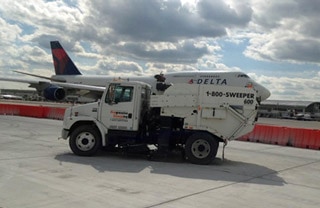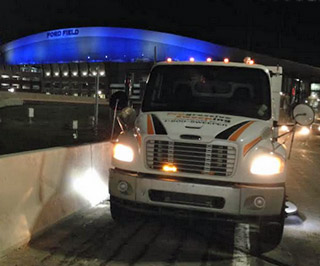Services provided by local governments include road repair, street cleaning, trash collection, electricity, and running water. Of these, arguably one of the easiest to successfully outsource with better cost control and a more successful outcome is street sweeping.
Keeping municipal roads swept and sanitary contributes to the safety and well-being of all citizens throughout a municipality. It is also one of the most visible signs of tax money being well (or poorly) spent.
As townships, cities, and counties look for new and innovative ways to stretch tax dollars further, street superintendents are eyeing municipal street sweeping needs with more scrutiny. Buying and maintaining a street sweeper – let alone a fleet – is expensive.
Increased local, state, and federal environmental mandates have also prompted many municipalities to turn to sub-contractors for street sweeping services familiar with compliance to help address compliance issues. Let’s look at factors that may help determine if in-house or out-sourced is the best fit for your municipal sweeping.
Size of Municipal Area May Determine Requirements
Cities, towns, villages, and boroughs all face the unique burden of economically providing street sweeping services. Best practices related to street sweeping address personnel, equipment, maintenance, and facility operations.
Because of the enormous cost of power sweeping vehicles and the unique set of employment recruiting for quality vehicle operators, local governments and metro agencies collaborate with public and private enterprises in solving the issue of street cleaning service in a variety of ways.
Some cities – particularly large metropolitan urban centers – do it all themselves. Others contract with a neighboring city or with their county to receive periodic service.
Smaller cities often enter into a service agreement with private companies to provide street sweeping. Yet another method is to contract major seasonal sweeping – spring sweeping after winter salt season and autumn following leaf-drop – with private firms. In these cases, a municipal service crew may use their own equipment and workers during other parts of the year.
Best Street Sweeping Practices Vary by Geography
Street sweeping is a costly municipal service. In part, that is because residents expect their cities to maintain safe road conditions in winter, which in many areas requires spreading salt or sand on streets and highways.
Street maintenance personnel typically work to prevent as much sand, salt, and dirt as possible from entering the storm sewer system.
Stormwater Pollution Prevention as a Driver
Depending upon part of the country, Storm Water Pollution Prevention Planning (SWPPP) may coordinate between river or lake improvement organizations State-EPA and citizen groups concerned about water quality.
Once in the sewers, sand and dirt must be removed at additional cost. Cleaning streets to remove unsafe sand or salt after winter, and before spring rains wash residue into the storm sewers also satisfies citizens’ desire for a safe and clean environment.
Maintaining and improving water quality has become a significant environmental issue. Street sweeping can be helpful, or even mandated as a method to affect nonpoint water pollution. By diverting and properly disposing of the sweepings from streets and storm sewers as one way to improve overall water quality.
Dust control is another reason cities and towns require periodic street sweeping. Controlling dust on roadways is typically a greater problem in warmer and dryer climates. States including Arizona, New Mexico and Southern California have passed legislation identifying levels of airborne particulate matter that is allowable. These quantifiable limits require a variety of measures surrounding construction areas to keep fugitive dust limited.
In these areas, streets are cleaned more frequently, and it is likely that a local municipal equipment pool would need to own and maintain more vacuum sweeping equipment.
Going green can save green too!
Some sweeper vehicle manufacturers and professional contract sweeper organizations including 1-800-SWEEPER promote sweeping, especially vacuum sweeping vehicles, as an answer to improving both fugitive dust control and water quality.
Each year, the municipal street sweeping services offered by our contractors helps to divert millions of pounds of dust and dirt that might otherwise end up in the air we breathe and the water we drink. At 1-800-SWEEPER, we share your desire to be good stewards of the earth. Preventing contaminated storm water runoff and fugitive dust control demonstrates your community’s commitment to the environment.
A cost-effective street sweeping program also keeps your community in compliance with TODAY’s local, state, and federal environmental regulations and avoids the costly fines associated with non-compliance.
Developing an RFP for Street Sweeping Service
Nearly all public works administrators, city managers and street maintenance professionals at regional and local levels share a common need to control costs while providing quality service. The concept of outsourcing community street cleaning may seem like an idea worth exploring. By skillfully developing a Request for Proposal (RFP) your municipal government can improve services at a lower total cost while employing a variety of best practices.
Clean city streets, county roads, and locally maintained stretches of freeway promote community pride while preserving and protecting the environment. Keep rising capital equipment and labor costs in check.
To learn more about municipal sweeping, or to request a quote for your city, township or county, call or fill out our contact form on the right. From on-call hourly power sweeping to establishing service on a contract basis, 1-800-SWEEPER Partners provide you your municipality with a dependable, value oriented sweeping solution using only licensed, bonded, drug-tested, professionally trained environmental technicians.



